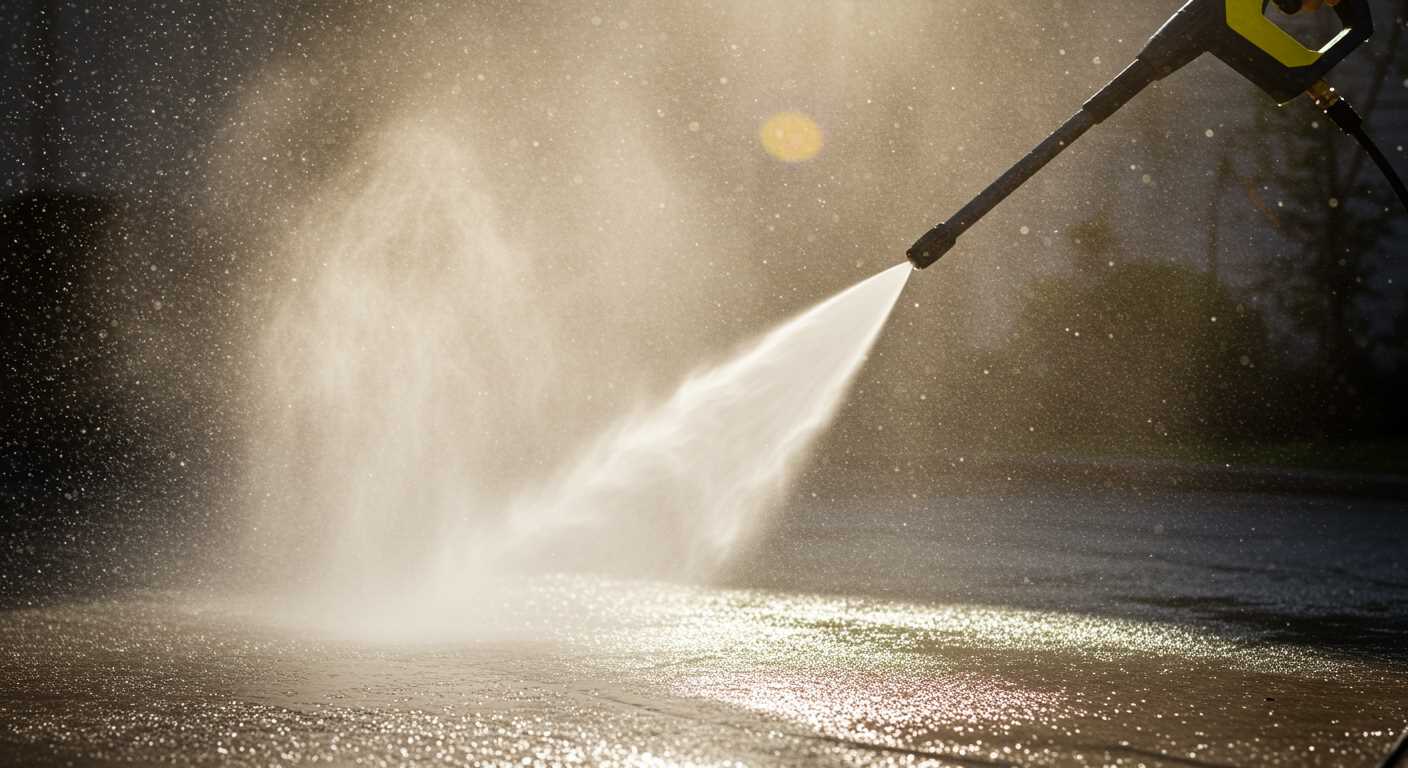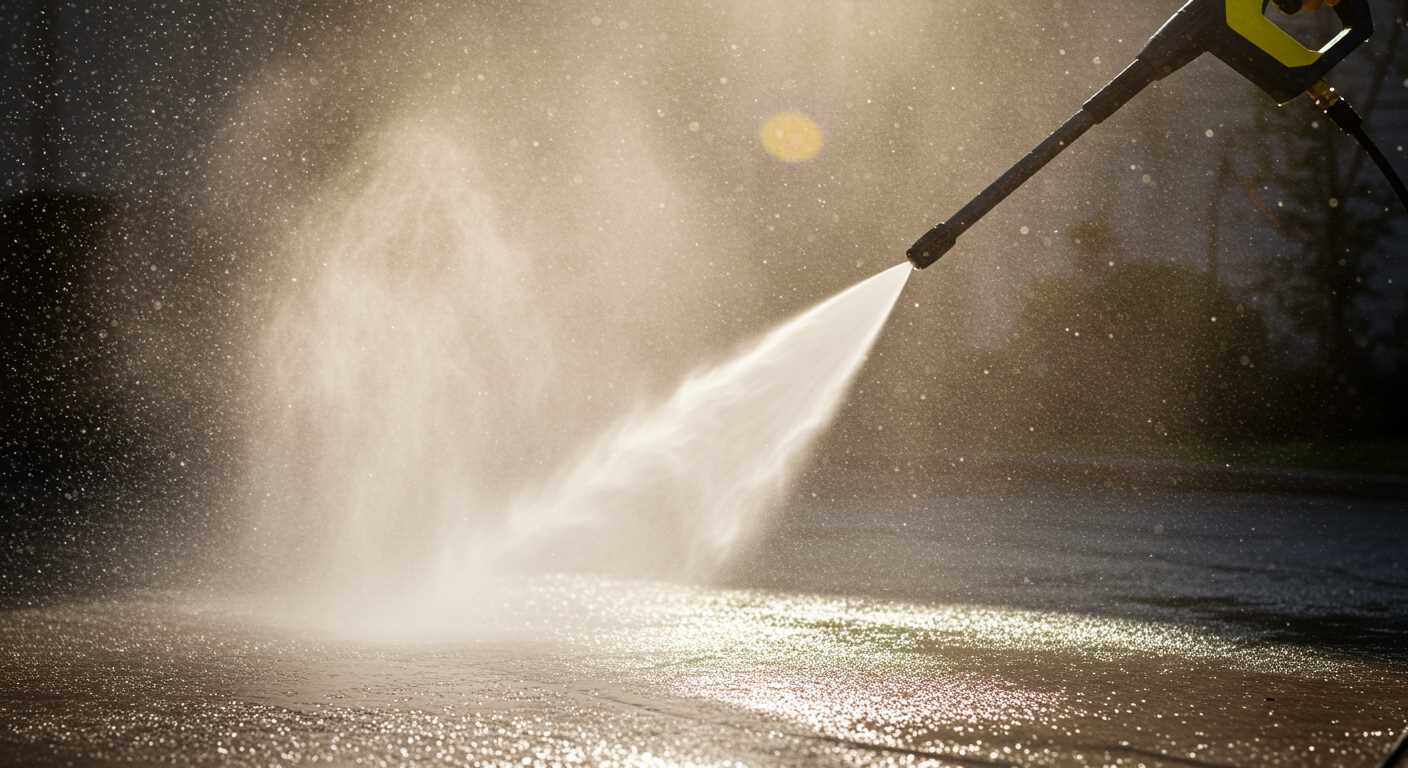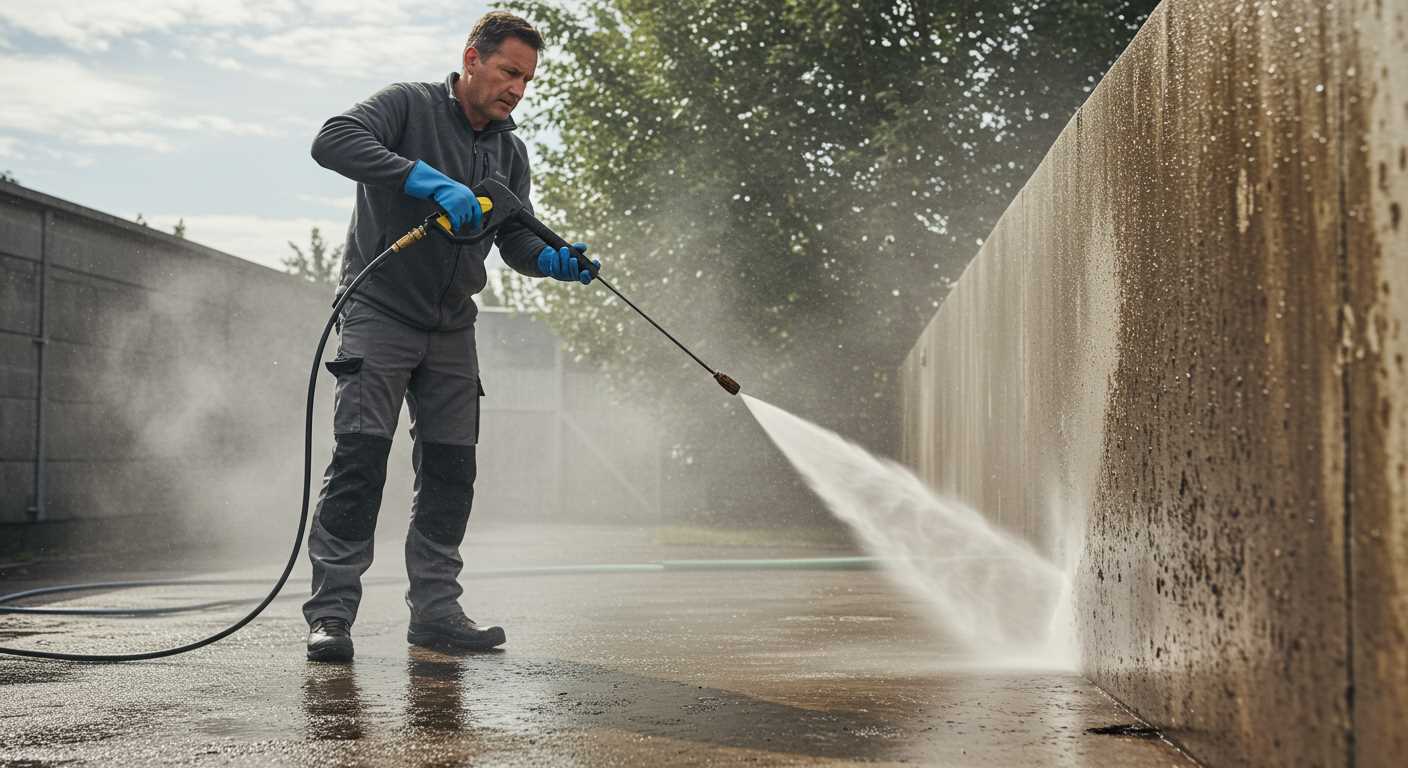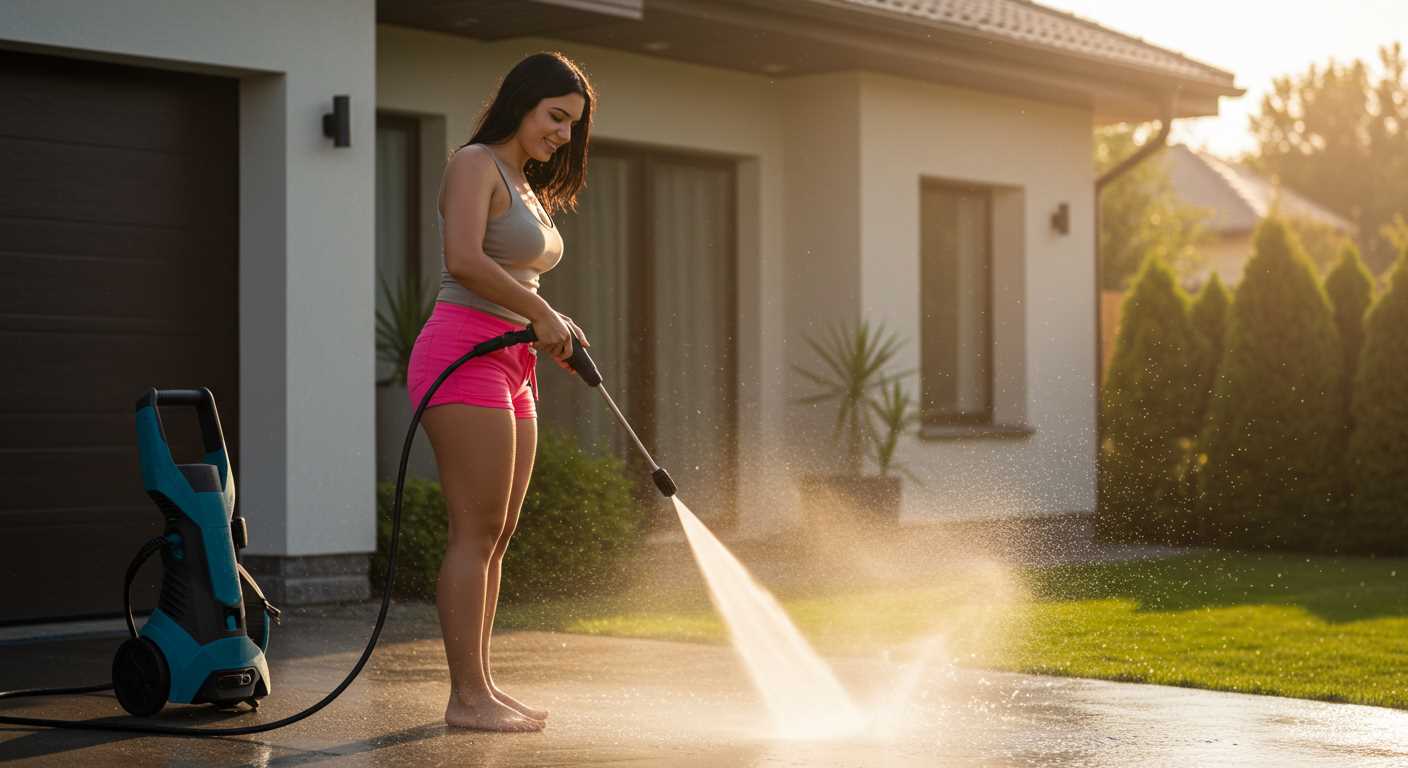




For optimal results, I always recommend using a biodegradable detergent specifically formulated for high-pressure equipment. During my decade of experience in the cleaning industry, I found that these products effectively break down stubborn grime while being gentle on surfaces and the environment. Brands like Krud Kutter or Simple Green have consistently delivered impressive cleaning power without damaging the underlying materials.
In my early days, I experimented with various homemade solutions, thinking they would save money. However, I quickly realised that many of these mixtures could cause more harm than good, leading to streaks or even permanent damage. A dedicated cleaner not only enhances performance but also prolongs the lifespan of your machine by preventing build-up in the pump and hoses.
When tackling specific tasks, such as automotive cleaning, I advise using a foam cannon attachment along with a dedicated car wash soap. This combination creates a thick layer of foam that clings to the surface, allowing the cleaner to break down dirt effectively while reducing the risk of scratching the paint. Trust me, investing in the right product will make all the difference in achieving that showroom shine.
Recommendations for Cleaning Agents
For optimal results in your cleaning tasks, I recommend using a dedicated detergent designed for high-powered machines. These formulations are specifically crafted to break down tough grime and stains without causing damage to surfaces. My favourite is a biodegradable option that ensures safety for the environment while still being incredibly effective.
When dealing with particular surfaces, like patios or driveways, a heavy-duty cleaner with degreasing properties works wonders. I’ve often faced stubborn oil stains, and a good degreaser made all the difference. Always remember to dilute it according to the manufacturer’s instructions to avoid any unwanted residue.
Specialty Cleaners for Various Tasks
If you’re cleaning vehicles, opt for a pH-balanced car wash soap. I once used a regular detergent, and it left streaks that took hours to remove. A product specifically for cars ensures a spotless finish while protecting the paintwork.
For wooden decks, a gentle, wood-safe cleaner helps in lifting dirt without stripping the natural finish. I had a client who was hesitant to clean their deck, fearing damage. After using a recommended wood cleaner, they were thrilled with the revitalised appearance without any harm done.
Additional Tips for Best Results
Always test any new cleaning agent on a small, inconspicuous area first. This simple step can save you from potential mishaps. Additionally, pairing your machine with the right accessories, such as nozzles and brushes, enhances performance. For instance, using a rotary nozzle can provide a deeper clean for tough tasks.
For those interested in tackling other projects, consider researching the best air compressor for da sander to complement your cleaning arsenal.
Understanding Different Types of Pressure Washer Solutions
For optimal cleaning results, selecting the right liquid is paramount. From my experience, the choice often boils down to the type of surface being cleaned. For instance, a biodegradable cleaner is fantastic for surfaces like wood or composite decking. These products break down easily and are less likely to harm plants or grass around your cleaning area.
Specialty Cleaners
Specialty formulations exist for specific tasks. If you’re tackling oil stains on driveways or garage floors, a degreaser is your best bet. These powerful agents penetrate and lift stubborn grime effectively. I remember using a heavy-duty degreaser on my own driveway, and the results were astonishing–years of built-up grease vanished in seconds.
Eco-Friendly Options
There’s a growing trend towards eco-friendly alternatives. Many brands now offer plant-based options that clean effectively without the harsh chemicals. I tried one recently and was pleasantly surprised by its performance. It cleaned my patio just as well as traditional products, without the risk of harming the environment. Always keep an eye on labels to ensure compatibility with your equipment; for instance, a pressure washer pump protector is essential when using any aggressive formulas to safeguard your machine.
Choosing the Right Solution for Specific Cleaning Tasks
For tackling stubborn grime on driveways, I recommend using a dedicated degreaser. In my experience, a product with a high alkaline content effectively breaks down oil and grease, making the cleaning process much smoother. Always check that the formula is compatible with your equipment to avoid any damage.
For Different Surfaces
- Wood Decks: Opt for a gentle cleaner designed for wood. Harsh chemicals can strip away the natural oils, leading to damage over time.
- Concrete: A heavy-duty cleaner works wonders here. Look for one that penetrates deeply to lift stains, especially from rust or oil.
- Vehicles: Use a pH-neutral car wash. It’s crucial to avoid any harsh acids that could damage the paintwork.
- Fences: Choose a mild bleach solution mixed with water to brighten the wood without causing deterioration.
Specialised Applications
- Mould and Mildew: A product containing sodium hypochlorite can effectively tackle these issues. However, ensure proper rinsing to prevent any residue.
- Windows: A specific glass cleaner mixed with water will leave a streak-free finish. It’s best to avoid anything too abrasive.
- Pool Areas: Select a cleaner that combats algae. The right formula will help maintain a clean and safe environment.
Each cleaning task demands a tailored approach. Always consider the surface material and the type of dirt you’re dealing with. A little knowledge goes a long way in achieving optimal results and preserving the integrity of your surfaces.
Environmental Considerations for Cleaning Agents
Choosing eco-friendly cleaners can significantly reduce your environmental footprint while maintaining effective cleaning results. When selecting products, consider these aspects:
- Biodegradability: Opt for cleaning agents that break down naturally without leaving harmful residues. This ensures that they do not linger in the environment or pollute waterways.
- Non-toxic Ingredients: Look for formulations free from harmful chemicals like phosphates, nitrates, and surfactants that could endanger aquatic life. Many brands offer natural alternatives that are equally effective.
- Concentration: Highly concentrated formulas often require less product per job, reducing waste and packaging. This can lead to a smaller carbon footprint during transportation.
In my experience, I’ve seen firsthand how choosing the right cleaning agent can positively impact local ecosystems. I recall a project where we switched to a plant-based cleaner that not only performed well but also reduced the risk of chemical runoff into nearby streams. The difference was noticeable, both in the cleanliness of the surfaces and the health of the surrounding environment.
Always read labels for certifications indicating environmental responsibility. Products marked with eco-labels often meet stringent environmental standards, giving you peace of mind about your choice.
It’s also important to consider how much water you’re using during a cleaning session. Using an efficient cleaning agent can help reduce the amount of water needed, making your approach more sustainable. I’ve worked with systems that maximise cleaning effectiveness while minimising water consumption, proving that you don’t need to sacrifice one for the other.
Finally, think about disposal methods. Proper disposal of unused or expired cleaning agents is essential to prevent environmental contamination. Many local waste management programmes offer guidelines for safe disposal.
Mixing Techniques for Pressure Washer Cleaning Solutions
To achieve optimal results, it’s vital to mix cleaning agents correctly. I recall a time when I underestimated the importance of ratios while preparing a degreaser for a particularly grimy garage floor. I ended up with a concoction that was too strong, damaging the surface instead of cleaning it. Here are some techniques to ensure you get it right.
Understanding Concentration Ratios
Always adhere to the manufacturer’s recommendations for dilution ratios. For example, many commercial cleaners suggest a mix of one part cleaner to four parts water. This not only maximises cleaning efficacy but also protects your equipment from damage caused by overly concentrated mixtures. I often keep a chart handy that outlines various ratios for different tasks, which has saved me from many mishaps.
Utilising Mixing Tools
Invest in a reliable mixing container and stick to it for all your cleaning preparations. I prefer using a large, graduated bucket with clear measurement markings. This way, I can accurately gauge the amount of each component. Remember to mix thoroughly; I always stir the solution until it’s uniform. If you skip this step, you risk inconsistencies in cleaning performance, leading to uneven results during application.
Before applying any mixture to a surface, especially delicate ones, conduct a patch test. I learned this lesson the hard way when applying a strong cleaner to a painted surface without testing first. The result was a patch of faded paint that stood out like a sore thumb. Always test in an inconspicuous area to avoid costly mistakes.
Lastly, never mix different types of cleaning agents unless you’re absolutely sure they are compatible. I once combined two different brands of cleaners, thinking they would enhance each other’s performance. Instead, I created a chemical reaction that produced a noxious gas, forcing me to evacuate the area. Always read labels carefully and err on the side of caution.
Safety Guidelines for Using Pressure Washer Solutions
Always wear appropriate personal protective equipment (PPE) when handling any cleaning agents. This includes gloves, goggles, and masks to prevent skin and eye irritation, as well as inhalation of harmful fumes. I once neglected to wear proper gloves while mixing a strong detergent, and I regretted it for days due to skin irritation.
Proper Storage and Handling
Store all cleaning agents in a cool, dry place, away from direct sunlight and extreme temperatures. I learned this the hard way when a bottle of concentrated cleaner expanded and spilled due to heat exposure, creating a hazardous mess. Always keep containers tightly sealed to avoid leaks and contamination.
Mixing Precautions
When combining different cleaning products, follow the manufacturer’s instructions carefully. Some chemicals can react violently, producing harmful gases or causing explosions. I once witnessed a colleague mix two seemingly harmless liquids without checking the labels, resulting in a frightening cloud of fumes. Always add chemicals to water, never the other way around, to prevent splashing and ensure safer mixing.
Rinse any equipment used for mixing thoroughly after each use to avoid cross-contamination between different substances. Regularly check for any signs of damage or wear in containers and hoses, as these can lead to leaks and spills.
Lastly, never aim the nozzle at yourself or others, as the force can cause serious injury, especially when using potent agents. Always maintain a safe distance and ensure that anyone nearby is aware of the cleaning process. I’ve seen accidents happen when people underestimated the power of the spray, so stay vigilant.
Common Mistakes to Avoid When Using Cleaning Solutions
One mistake I’ve seen countless times is using a solution that isn’t compatible with the surface being cleaned. For instance, using a harsh chemical on painted surfaces can strip the paint and lead to costly repairs. Always check the manufacturer’s recommendations to ensure compatibility.
Misjudging Concentration Levels
Another frequent error is not following the recommended dilution ratios. A stronger mix might seem like a good idea for stubborn stains, but it can damage surfaces or leave residues that attract dirt. I recall a friend who used a concentrated detergent on his driveway; it not only discoloured the concrete but also took weeks to restore its original appearance.
Skipping the Pre-Test
Never skip the pre-test on a small, inconspicuous area. I remember a time when I was in a rush and didn’t test a new cleaner on a patio. The results were disastrous; the product reacted unfavourably with the stone, leaving permanent marks. Always take the time for this crucial step.
| Mistake | Consequence | Tip |
|---|---|---|
| Using incompatible cleaner | Surface damage | Check manufacturer’s guidelines |
| Incorrect dilution | Surface damage, residues | Follow dilution instructions |
| Skipping pre-test | Permanent marks, discolouration | Test on inconspicuous area |
Another pitfall is rushing the application process. I’ve learnt that allowing the cleaner to dwell for the recommended time can be the difference between a mediocre clean and a brilliant one. It’s tempting to blast away without waiting, but patience pays off.
Lastly, improper storage of cleaning products can lead to degradation. I once left a bottle of cleaner in the garage over winter; when I finally opened it, the contents had separated and were unusable. Store these products according to the labels to maintain their integrity.
Where to Purchase Quality Cleaning Products for High-Pressure Equipment
For reliable cleaning agents, I often recommend checking out specialised home improvement stores. They usually stock a wide range of reputable brands that offer formulations tailored for various surfaces. Brands like Karcher and Ryobi have dedicated sections that cover everything from degreasers to eco-friendly options. Additionally, visiting your local hardware store can yield great results, as they often carry products that might not be available online.
Online Retailers
Online platforms like Amazon and eBay provide a vast selection, allowing you to compare customer reviews and ratings. I’ve found that reading feedback from other users can be invaluable. Take note of the comments regarding effectiveness and ease of use. This approach saved me from purchasing a subpar product during a recent deep clean of my patio.
Local Suppliers and Distributors
Don’t overlook local suppliers who focus on cleaning equipment. They often offer expert advice and may even provide samples. I once discovered a fantastic eco-friendly detergent at a regional distributor, which turned out to be perfect for my needs and significantly improved my cleaning results. Building a relationship with these suppliers can also lead to discounts or exclusive products not found in larger chains.




.jpg)


